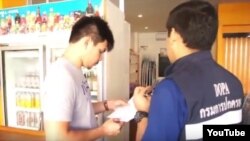In an area known for harboring some of Thailand's most notorious dens of organized crime and vice, a special squad of Thai army officers and interior ministry forces, acting on tip, moved in this week to nab a group of lawbreakers.
It was to be the latest show of force making good on the Thai junta's vow to crackdown on social ills, foreign and domestic.
Local media had been alerted to gather outside a particular apartment in South Pattaya for the spectacular raid Wednesday afternoon.
It turned out to be a house of cards.
Bursting through the doors of a rented second floor room, the authorities found a rather sedate group of mostly elderly foreigners — 26 men and six women — engaged in the act of playing a centuries-old game known as bridge, and following all the rules, according to Hoyle.
“We thought the SWAT team had arrived,” recalled 74-year-old Jeremy Watson.
A German woman was the last offender in custody on Thursday, refusing to sign a gambling confession as a prerequisite to being granted bail for 5,000 baht (approximately $140).
“I respect her because I feel like I should have done the same, but I didn't have the guts,” said Watson, who did not hesitate to confess his role as ringleader.
Duplicate bridge is “not a gambling game, at all,” the British national explained to VOA.
Watson insists all players were properly attired and there was not the faintest aroma from anything being smoked that would have attracted the attention of a long-haired backpacker, let alone military troops.
“We weren't even allowed any beer because it was between two o'clock and five o'clock and they're not allowed to serve anything,” he added.
Among those arrested was an 84-year-old Dutch woman.
“I expected that as the pack leader I might get hauled off," said Watson, who has resided in Thailand since 1969. "I did not expect the whole group to be hauled off.
“Because duplicate bridge is a game where you use the computer on each table and report each hand result to a main head computer, they decided that was obviously gambling as we were putting it onto the [Internet]," he added. "So they charged us with gambling.”
The computers have been seized as evidence.
Complaint lodged
The bridge community has been told that a complaint was lodged with the prime minister's office after local police declined to act against the bridge group.
Sources tell VOA that the complaint, filed to police and then the prime minister's office, came from a man involved in a disagreement with the owners of the building where the bridge club meets.
Under Article 44, put in force after the 2014 coup, the prime minister has sweeping powers to curb “acts deemed harmful to national peace and stability.”
“No, of course they were not up to anything illegal. There was a misunderstanding,” said Esther Sophonpanich, the president of the Asia Pacific Bridge Federation, who rushed to the aid of her fellow card players in distress.
“There's still a misconception that if you use cards you are gambling,” she told VOA. “Of course, in many countries in Asia it seems to be like that.”
Police have occasionally poked their heads into bridge and card games in Thailand, looking for gambling violations.
Bridge, however, is legal and registered as an activity with the Sports Authority of Thailand.
The bridge players, however, were hauled away on another charge: the Draconian Section 8 of the Playing Cards Act of 1935, which decrees no individual may possess more than 120 cards at any one time.
The brush with the law — the first since the Jomtien and Pattaya Bridge Club was formed in 1994 — and the resulting court cases have ruffled players, according to Watson, as all the suspects are now prohibited from leaving the kingdom pending resolution of the legal process.
On its web page, a disclaimer prominently positioned beside the image of a heart, club, diamond and spade rotating in unison, says the establishment is “CLOSED TEMPORARILY whilst we get a new license to have cards on the premises.”





